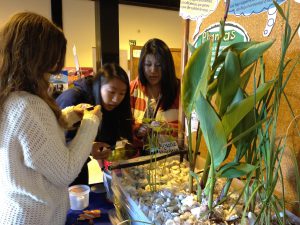Innovative projects connect community with art and science

Art and science many times are worlds apart, but for the 10 San Diego teams that are part of Art of Science Learning, art and science are inseparable.
Art of Science Learning is a National Science Foundation-funded initiative that is challenging three incubators, one of them in San Diego, to use a new arts-based curriculum to solve civic challenges in each region.
In San Diego, the 10 teams are focusing their projects on the region’s challenges with water, using art and technology in creative ways.
The Trash to Paradise team, which is comprised of members from both San Diego and Tijuana, is testing an ecosystem that uses trash and wetland plants to treat water locally in response to untreated sewage flowing from the Tijuana River Valley into Imperial Beach. This pilot project demonstrates how collaborative efforts can be scaled for greater change.
“We’re trying to tackle a binational problem that affects both San Diego and Tijuana,” said team member Bianca Alvarado. “I am really hopeful and happy that we can also find a binational solution to this issue.”
Last Thursday, Alvarado and her team, as well as the rest of the teams that are part of the San Diego Art of Science Learning initiative, presented their projects to the public at a PLAY DAY for Educators. There, the teams had a chance to receive feedback from the community, especially from educators who got a lot of ideas of how to implement these projects at a smaller scale in their classrooms.
Dozens of hands-on creative science, technology, engineering and math (STEM) activities took place in Balboa Park at the San Diego Museum of Art and Plaza de Panama, creating a unique opportunity for educators to experience inspiring and fun projects they can use in their own classrooms and other learning settings.
“The incubator teams have transformed their ideas into creative learning programs and practical innovations,” said Nan Renner, director of the San Diego Incubator. “PLAY DAY is a perfect opportunity for the teams to share their innovations while in development and gather inspiration from the broader community.”
The San Diego Incubator is focusing in water issues. The others are working on urban nutrition (Chicago) and transportation alternatives (Worcester, MA).
“Through the 26 Art of Science Learning innovation teams now in the field, we’re seeing the power of arts-based learning to impact communities and change lives,” said Harvey Seifter, Art of Science Learning founder, director and principal investigator. “In this context, the arts support multiple goals critical to innovation – catalyzing creativity, expanding opportunities for communication, and fostering effective cross disciplinary collaboration.”
The feedback the teams received during PLAY DAY will be taken into consideration as a way to improve their projects, Renner said.
One of those teams, The Dewers, will be featured in an interactive art exhibit with biologically inspired sculptures for atmospheric water harvesting. A new bilingual learning kit—emphasizing form and function—will be adaptable in scale in different contexts.
“Our project can be adapted and implemented into the school curriculum,” said team member Gwen Gomez. “It is a fun way to teach children that water is important, and that they can use classroom materials to make a difference.”
For more information on Art of Science Learning, visit www.artofsciencelearning.org.





